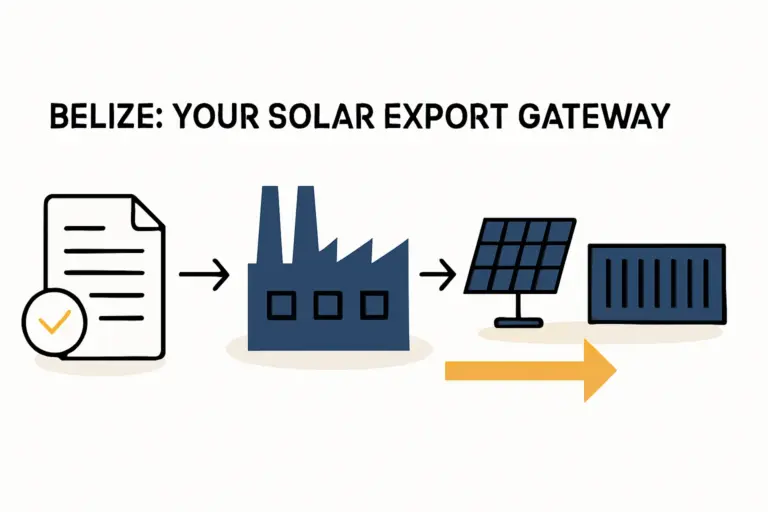For international entrepreneurs exploring new frontiers in renewable energy, Belize is a compelling choice. Its strategic location as a bridge between the Caribbean and Central America, combined with a stable political environment and government support for foreign investment, creates a promising climate for manufacturing.
However, transforming this potential into a successful solar module factory requires a clear understanding of the country’s regulatory landscape. Many promising ventures falter not due to a lack of market demand, but from a failure to navigate the essential, multi-layered approval process.
This guide maps out the key legal and administrative steps for establishing a solar module manufacturing facility in Belize. Designed for business professionals who are experts in their own fields but may be new to the intricacies of Belizean investment law, it provides a clear roadmap—from initial business registration to full operational compliance—ensuring your project is built on a solid legal foundation from day one.
Table of Contents
The Regulatory Framework: A Two-Tiered Approach for Foreign Investors
Establishing a manufacturing operation in Belize is a multi-step process, not a single action. The process logically divides into two main phases:
- Corporate and Investment Registration: Establishing the legal business entity and securing formal approval as a foreign investor, which often includes qualifying for significant fiscal incentives.
- Operational Permitting and Compliance: Obtaining the specific licenses and approvals required for construction, manufacturing, environmental standards, and trade.
A common pitfall for new investors is focusing solely on the second phase without properly structuring the first. Experience from J.v.G. turnkey projects in similar markets shows that securing investment incentives before starting the operational setup is essential for long-term financial viability.

Step 1: Business Registration and Investment Approval
The government of Belize has streamlined its foreign investment process through a central authority, creating a more predictable path for serious applicants.
The Central Role of BELTRAIDE
The Belize Trade and Investment Development Service (BELTRAIDE) is the government’s primary agency for facilitating investment. It functions as a one-stop shop, guiding investors through the necessary procedures and connecting them with relevant ministries. Engaging with BELTRAIDE early in the planning process is a crucial first step.
Registering Your Business Entity
Before any investment application can proceed, a formal business entity must be established in Belize. This process is managed by the Belize Companies and Corporate Affairs Registry (BCCAR). Foreign investors typically choose one of two paths:
- Forming a new Belizean company: This is the most common approach, creating a distinct legal entity under Belizean law.
- Registering a branch of a foreign company: An existing international company can register a branch to operate within Belize.
The choice between these structures impacts both liability and taxation, so it is essential to seek local legal counsel to determine the most suitable option for your business goals.
Obtaining an Investment Concession (The Fiscal Incentives Act)
This is perhaps the most critical step for ensuring the financial success of a solar manufacturing project. The Fiscal Incentives Act of 1990 is designed to attract investment in key sectors, including manufacturing. Securing a “Development Concession” allows a solar factory to receive substantial benefits, such as:
- A tax holiday from corporate taxes for up to 15 years.
- Exemption from import duties on machinery, equipment, raw materials, and specialized tools required for the factory.
The application is submitted through BELTRAIDE and requires a detailed business plan demonstrating the project’s economic benefits to Belize, including job creation and export potential.
This structured approach ensures that all legal and financial foundations are in place before significant capital is committed to construction and equipment. A full understanding of the investment requirements for solar manufacturing at this stage is essential for a compelling application.
Step 2: Securing Operational Permits and Licenses
Once the corporate entity and investment concession are secured, the focus shifts to the physical and operational aspects of the factory.
Environmental Compliance: The Department of the Environment (DOE)
All industrial projects in Belize must comply with the Environmental Protection Act. For a solar module factory, this involves a mandatory environmental review conducted by the Department of the Environment (DOE).
Depending on the scale and location of the proposed factory, the DOE will require either:
- An Environmental Compliance Plan (ECP): For smaller-scale projects with a manageable environmental footprint.
- A full Environmental Impact Assessment (EIA): For larger, more complex industrial facilities.
The EIA/ECP process assesses potential impacts on the local environment—from water usage to waste disposal—and outlines the mitigation measures the factory must implement. This step is non-negotiable and must be completed before any construction can begin.
Building and Trade Licenses
Once environmental clearance is granted, the project must obtain local permits. This involves:
- Building Permit: Issued by the local municipal authority (e.g., Belize City Council or a Town Board) after reviewing the factory’s architectural and engineering plans.
- Trade License: A general license to conduct business, also issued by the local municipal authority once the facility is ready to operate.
These local approvals ensure the factory adheres to national building codes, safety standards, and zoning regulations.

A Strategic Alternative: The Export Processing Zone (EPZ) Program
For businesses focused primarily on exporting their solar modules, Belize offers an alternative to the Fiscal Incentives Act: the Export Processing Zone (EPZ) program. Governed by the EPZ Act, this program provides an even more comprehensive set of benefits for export-oriented manufacturers.
Companies operating within a designated EPZ receive:
- Complete exemption from all import and export duties.
- Exemption from corporate, withholding, and capital gains taxes for the life of the project.
- Exemption from trade licensing and other municipal fees.
The trade-off is that businesses under the EPZ program are generally restricted from selling products in the domestic Belizean market. The choice between the Fiscal Incentives Act and the EPZ program is strategic and depends entirely on the company’s target market.
Key Considerations for a Smooth Process
Navigating these regulations effectively requires foresight and diligent planning.
- Timeline and Planning: The entire approval process, from company registration to obtaining all operational permits, can realistically take 6 to 12 months. This timeline must be factored into your overall project plan. A comprehensive plan for starting a solar factory integrates these regulatory milestones from the outset.
- Local Expertise: Engaging local legal and business consultants—who are well-versed in Belizean law and have established relationships with government agencies—can prevent costly delays and administrative errors.
- Labor Regulations: The Belize Labour Act governs all aspects of employment, including contracts, working hours, and termination procedures. A clear understanding of these regulations is vital for managing the factory’s workforce.

Frequently Asked Questions (FAQ)
Q: What is the main difference between the Fiscal Incentives Act and the EPZ program?
A: The Fiscal Incentives Act offers temporary tax and duty relief (up to 15 years) and allows for sales in both domestic and export markets. The EPZ program offers more comprehensive, lifetime exemptions but is designed almost exclusively for export-oriented businesses.
Q: Do I need a Belizean partner to invest?
A: No, Belizean law permits 100% foreign ownership of companies in most sectors, including manufacturing. While a local partner is not required, their expertise can be valuable.
Q: How long does the investment approval process typically take?
A: After submitting a complete application to BELTRAIDE, the review and approval for a Development Concession under the Fiscal Incentives Act typically takes 3 to 6 months.
Q: What are the ongoing compliance requirements?
A: Companies with a Development Concession must submit annual compliance reports to BELTRAIDE, demonstrating they are meeting the commitments made in their business plan (e.g., employment numbers, investment levels). EPZ companies have similar reporting requirements to the EPZ Committee. All companies must adhere to environmental and labor laws.
Q: Are there specific regulations for importing solar manufacturing equipment?
A: While both incentive programs offer duty exemptions, the importation process must follow standard customs procedures. All equipment must be properly declared and documented. Working with experienced solar factory turnkey solution providers simplifies this process, as they typically manage the entire logistics and customs clearance for the machinery.
Conclusion
For the well-prepared investor, successfully establishing a solar factory in Belize is an achievable goal, thanks to a clear and well-defined regulatory path. By understanding the roles of key agencies like BELTRAIDE and the DOE, and strategically choosing between the available investment incentive programs, an investor can build a robust and profitable enterprise that contributes to both their business objectives and the renewable energy landscape of the region.



